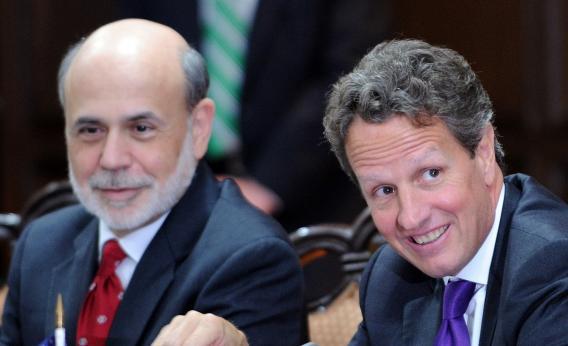Central banks have been buying up government debt lately, and they could, in principle, engage in the digital equivalent of setting the bonds on fire. Lately speculation about this has been making the rounds on Wall Street, and I got two emails this morning asking me about it.
This is one of these cases where the economics of the situation look different from the political economy of the situation. According to the up-to-date models I’m familiar with, the Federal Reserve burning its Treasury bonds should have no impact at all on anything. If you recall your equation of exchange:
M • V = P • Y
In other words, the money supply times the velocity of money equals the price level times the output level. You’ll see that bond burning has no impact on either M or V and thus has neither real nor nominal impact. Indeed, the argument is simply the converse of the traditional argument that quantitative easing doesn’t do anything other than add to banks’ inert excess reserves. The size of the central bank balance sheet per se doesn’t matter.
What does matter? Expectations. Bond burning paired with a promise to never, ever, ever let inflation go above 2 percent won’t do anything because you’d be keeping expectations anchored. Conversely, bond burning paired with a clear statement of greater inflation tolerance would have a very meaningful impact—because of the inflation tolerance not because of the bond burning.
So might this be a good idea anyway? Yes.
For one thing, while I don’t think it’s currently true that central banks have a credibility problem when trying to raise nominal expectations, the worry that they might have such a problem is perfectly coherent, and bond burning might be a way out of it. It also might impact fiscal policy indirectly. An awful lot of pixels and column-inches have been spilled on the obviously false (somehow by coincidence the threshold is invariably found to be a round number in a base-10 system, presumably the economics of Tau Alpha C, where people have three fingers on a hand work differently) idea that there’s some magic debt-to-GDP ratio threshold at which point economic growth slows. Bond burning would put us further away from the arbitrary threshold and thus perhaps increase political tolerance for budget deficits. Alternatively, right now expansionary monetary policy often faces a lot of political resistance, some of which may be due to the opaque nature of its operations. Direct monetization—Fed gives Treasury money in exchange for bonds, Treasury gives money to taxpayers, Fed burns the bonds and says the point is to raise present and expected nominal income levels—might be a clearer way of communicating to nonspecialists what’s going on and why it’s supposed to work.
